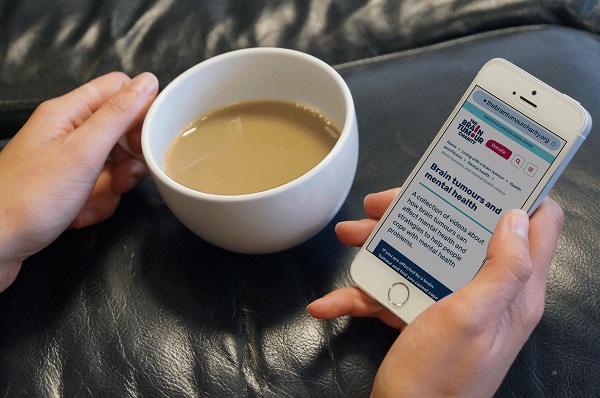Scanxiety
Scanxiety (scan anxiety) is a fear or anxiety about MRI or CT scans and their results
On this page:
How can I reduce scanxiety before and during my scan?
How can I cope with scanxiety while waiting for my scan results?
What is scanxiety?
You’re likely to need scans if doctors think you may have a brain tumour. If you’re diagnosed with a brain tumour, you’ll usually have many scans throughout your treatment and care.
For some people, this can cause fear and anxiety – either about:
- being in the scanner. “I get claustrophobic. What is it going to be like?”
- waiting for the results. “Has the tumour have grown or returned?”
People with these feelings often call them ‘scanxiety’ (scan anxiety).
You’re not alone
Many patients with brain tumours experience different levels of scanxiety. It may not feel the same for everyone, but any form of anxiety, including scanxiety, can impact your quality of life. It’s important to remember you’re not alone and you should not feel ashamed to seek help. Here you will find some simple tips on coping with scanxiety, based on the experiences of patients, friends, family and carers.
We understand that it’s not just the person having the scan that experiences scanxiety, but also those that support them. Much of the information, tips and techniques below are relevant to you also.
I try to stay positive, but I find as a scan is nearing my level of reading and research increases. I find myself preparing for possible scenarios and outcomes
Vicky
Scanxiety Podcast

Podcast – Episode 24
Betty and Sarah about their experience of having scans and the very real anxiety that often goes with this.
They share some of the things they have found helpful in reducing the level of anxiety they feel in the run-up to their scan and things they do during the scan to help them get through the experience.
How can I reduce scanxiety before and during my scan?
-
MRI scans can be a claustrophobic experience. The loud and unusual noises can cause anxiety for some people, and techniques for coping with this will be different for everyone.
It can be helpful to find out as much information as possible about the process before having your scan. This can help you overcome the fear of the unknown.
-
Medical staff will give you a pair of headphones so that you can speak with the scan team, if you need to. Also, you can use these to play music. For most scans you’ll be able to bring your own music or CD to play. You can pick what you want before your scan . This could be your most upbeat song or soothing sounds, whichever works best for you. But remember you’ll have to stay still for the scan, so no tapping toes!
-
The scan team may also be able to provide mirrors that they will place in your eye line, so you can see out of the scanner. This can help the scanner feel less enclosed and claustrophobic.
“I’m slightly claustrophobic so I ask for the mirror and headphones for music if available. I also ask for the time estimate so I at least know when it is over.” Paul
-
If you’re having an MRI scan, you can usually take someone into the room with you. But this may depend on a number of factors, including scan type, hospital policy and also practicalities such as space.
If you’re having a CT scan, you won’t usually be able to have anyone in the room, as this type of scan uses x-rays. But it may be allowed in very special circumstances. Remember to speak to your medical team about this before your scan.
-
Mindfulness is a tool used to channel your thoughts, ease the mind and be more present. It has been shown to reduce anxiety in people with brain tumours.
People have found it can help to simply close their eyes and practice mindful breathing, such as:
- breathing in on the count of one and out on the count of two
- count your breaths in blocks of ten
- count breaths up to one hundred.
“For the scan itself I practice yoga breathing.” Joanne
Or you may prefer to use a more structured mindfulness practice when you’re in the scanner.
Make sure there’s no tension in your body. Starting at your feet, imagine light and warmth radiating through your body. Imagine this feeling slowly travelling through your body, finishing at the top of your head. Repeat as many times as you want.
It may be helpful to practice these techniques before your scan day.
The other day I tried to convince myself I was at a spa. I try to think of fun memories or plan fantasy holidays in my head during the scan itself.
Laura

Join our community on Facebook
Our closed Facebook groups are a great place to connect with other people affected by a brain tumour and share exercise tips.
Further support
While self-help techniques can be really useful, it’s important you still speak about any worries or fears with your medical team. Don’t feel embarrassed; many people experience fear inside the scanner and your scan team are there to help make the process as smooth as possible.
If your anxiety is severe or interrupts the scanning process, your team may suggest a prescription from your GP for a mild sedative on the day. It’s important you have this conversation with your medical team before the day of the scan, as these will not be available from the MRI department on the day. You’ll also need to arrange for someone to pick you up afterwards.
How can I cope with scanxiety while waiting for my scan results?
Although it’s natural to worry about your scan results, if this worry and anxiety is becoming severe or interfering with your life, make sure you seek help and speak to your medical team or GP.
We’ve put together some techniques that other people affected by brain tumours have found helpful when waiting for scan results:
-
Although it seems simple, keeping busy in the lead up to scan results can be a good way to keep your mind off them. Other people have found that starting a new hobby, such as taking a trip or having a day out are great distractions from scanxiety. Or something as simple as reading a book, watching a film or spending time with loved ones can be a positive way to keep scanxiety at bay.
-
Talking to others in a similar situation can be a powerful tool to help reduce your anxieties and gain peer support. Our closed Facebook support groups may be a great place for you to start.
You may also like to share your story more widely. This may not only be therapeutic for you, but may help others who have similar worries and anxieties.
For some people, sharing widely may not be for them.
“I find it easier the less people who know the scan is coming – that way you can control what you tell people and when, instead of feeling overwhelmed with messages.” Anon
But talking to selected others can still help. You could talk to a close friend, who isn’t in the same situation, to give a different perspective on it.
“I was talking to a friend today – she said I should treat it like a mammogram or smear test, which I also have yearly but have no problems with. Looking at it like that, she is right – it’s just another test to wait for the results of.” Aileen
Do what feels right for you!
Find out more about how to share your story
-
While mindfulness may not be for everyone, it has helped some people reduce their levels of anxiety. The NHS provides several tips on their website on how to practice mindfulness.
Here are a few tips on how to be more mindful:
- Be aware of the everyday and note the small things about your surroundings. This can help keep your mind in the present, e.g. go for a walk and notice the leaves blowing on the trees. This technique works because, if you’re in the present, it’s harder to relive the past, such as negative outcomes of previous scans. It can also help to stop you anticipating the outcome of future scans.
- Naming thoughts and feelings can be a powerful tool. You can do this by silently or verbally noting what you’re feeling, e.g. ‘this is anxiety’, ‘I am feeling anxious about my scan results’. This can help give you awareness of your feelings. Once you’ve identified what you’re feeling, it can be easier to cope with. Sometimes noting a feeling is enough for it to pass.
- Sitting meditation, yoga and tai-chi can also be helpful practices to stay in the present away from anxieties.
While some people find it difficult to ‘be in the moment’ and practice being mindful there are a number of other tools that can help. Physical resources can be downloaded from the internet, such as free adult mindfulness colouring sheets.
It’s important to remember mindfulness will naturally be difficult to begin with. But it does get easier with practice. The key is to stick at it and keep trying. There is no right or wrong way to practice mindfulness.

Free counselling
If you need to talk, we’re here for you. We offer free sessions to help you cope.
Support and Information Services
Research & Clinical Trials Information
You can also join our active online community.
In this section

Get support
If you need someone to talk to or advice on where to get help, our Support and Information team is available by phone, email or live-chat.
Share your experiences and help create change
By taking part in our Improving Brain Tumour Care surveys and sharing your experiences, you can help us improve treatment and care for everyone affected by a brain tumour.


